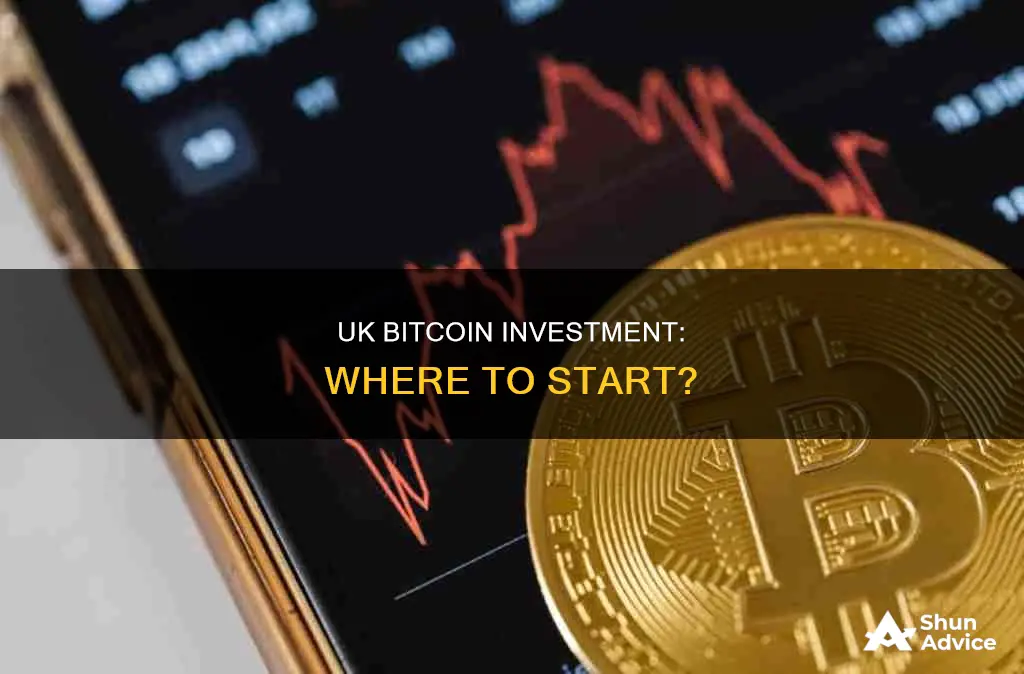
Investing in Bitcoin can be a risky business, but if you're prepared to take the chance, there are several ways to buy and sell the cryptocurrency in the UK.
First, you'll need to set up a wallet to store, receive and send bitcoin. You can do this by downloading a wallet app on your phone.
Next, you'll need to buy some Bitcoin. You can do this by signing up to a cryptocurrency exchange site, such as Coinbase, Binance, Kraken, or Bitstamp, and topping up your account using a debit card or bank transfer. You can then buy and sell Bitcoin on the exchange or download a digital wallet to remove it from the exchange.
It's important to note that Bitcoin is extremely volatile and does not offer protection on your investment. There are also a lot of scams involving Bitcoin, so it's important to be cautious and only deal with reputable exchanges.
| Characteristics | Values |
|---|---|
| Risk | High |
| Wallet | Needed to store, receive and send bitcoin |
| Wallet security | Keep private keys safe, offline and up-to-date |
| Investment strategy | Passive or active |
| Payment methods | Bank transfer, debit card, credit card |
| Investment advice | Only invest what you are prepared to lose |
What You'll Learn

Setting up a wallet to store, send and receive bitcoin
There are several types of wallets, including mobile and desktop wallets, hardware wallets, and paper wallets. Mobile and desktop wallets are convenient and ideal for making transactions face-to-face. They are designed to use QR codes to make quick and seamless transactions. However, there is a risk of losing funds if your device is damaged or lost.
Hardware wallets are one of the most secure methods to store funds and are ideal for storing large amounts of bitcoin. They are more difficult to use while mobile and are not designed for scanning QR codes.
Paper wallets are completely free and highly secure. You can create an offline Bitcoin address to receive your bitcoin and then send the bitcoin to the generated address.
To send or receive bitcoin, you will need a bitcoin wallet address. A bitcoin address is a string of 26-35 characters that make the account uniquely identifiable. These addresses start with either '1', '3', or 'bc1'.
When choosing a wallet, consider factors such as security, fee customization, and whether it gives you full control over your bitcoin. Some wallets offer two-factor authentication for added security. It is also important to back up your wallet and create offline backups of your private keys to protect against robbery, fire, or hard drive failure.
Some popular wallet options include blockchain.com, Muun wallet, Keys.casa, and the Bitcoin.com Wallet app.
Smart Bitcoin Investments: Turning $100 into a Fortune
You may want to see also

Understanding the risks of investing in bitcoin
Bitcoin is a high-risk investment. It is incredibly volatile, and investors could easily lose half their cash in a much shorter time than with stock market investments. It's important to be aware of the risks before investing.
Firstly, the market is unpredictable and fluctuating. The price of bitcoin is constantly changing, and there is no telling if you will get a return on your investment.
Secondly, bitcoin is technology-based, which means it is susceptible to cyberattacks and hacking. Many reports suggest that buyers lose their investments on exchanges, and if you lose your private keys, there is rarely a way to retrieve your coins.
Thirdly, there is a fair amount of fraud in the bitcoin market. The Consumer Finance Protection Bureau and the Securities and Exchange Commission have warned against transactions where investors are duped out of their bitcoins in fraudulent exchanges.
Another risk is the lack of regulation. Currently, the bitcoin market is operating without any major regulations, and it is not widely accepted as a currency. There is also no central authority, which means that investors may be left in the lurch if complications arise.
Finally, there is a widespread belief that cryptocurrencies provide criminal organisations with a means of committing fraud and money laundering. While this may not directly impact most investors, it is a risk to be aware of.
Overall, investing in bitcoin can be a risky proposition, and it is important to do your research and understand the potential pitfalls before investing any money.
The Ultimate Guide to Investing in Bitcoin (Philippines)
You may want to see also

How to buy bitcoin in the UK
Step 1: Research
Before you buy bitcoin, it is important to do your research. This includes understanding how bitcoin and blockchain technology work, as well as exploring different storage methods.
Step 2: Set up a wallet
Before purchasing bitcoin, you need to set up a wallet to store, receive and send bitcoin. You can download a wallet app from the App Store, or use online wallet services such as blockchain.com or Muun wallet.
Step 3: Choose an exchange
The most common way to buy bitcoin is by using a cryptocurrency exchange site. Popular options in the UK include Coinbase, Binance, Kraken, and Bitfinex. You will need to set up an account and provide personal information, such as your email address, phone number, and sometimes proof of address and government ID.
Step 4: Make a deposit
Once your account is set up, you will need to deposit funds. You can do this by linking your bank account or debit/credit card to your exchange account. There may be fees involved, and the time it takes for the funds to show up in your account will depend on the payment method.
Step 5: Buy bitcoin
Now that your account is funded, you can buy bitcoin. Simply enter the amount you want to purchase, review the details, and confirm the transaction.
Step 6: Store your bitcoin
You can choose to store your bitcoin on the exchange or transfer it to your wallet. It is recommended to set up two-factor authentication and other security measures to protect your bitcoin.
Step 7: Cash in your gains
If you decide to sell your bitcoin, you can do so through the exchange or your wallet. Be aware that there may be fees involved, and the process for withdrawing funds may vary depending on the platform.
Important things to keep in mind:
- Bitcoin is a high-risk and volatile investment. You should only invest money you are prepared to lose.
- Cryptocurrency is not protected in the same way as money in a bank account. If something goes wrong, you may not be able to get your money back.
- There are many scams involving bitcoin and cryptocurrency exchanges. Only deal through reputable and regulated exchanges.
- You may have to pay taxes on any profits made from selling bitcoin. In the UK, this could include capital gains tax or income tax.
Strategic Investments to Make Before the Next Bitcoin Halving
You may want to see also

How to sell bitcoin in the UK
Selling Bitcoin in the UK can be done in several ways, each with its own pros and cons. Here is a step-by-step guide on how to sell Bitcoin in the UK:
- Choose a Selling Platform: The first step is to select a reliable platform to sell your Bitcoin. Popular options in the UK include cryptocurrency exchanges such as Coinbase, Binance, Kraken, Bittrex, and Bitfinex. These exchanges offer different features, fees, and payment methods, so it is essential to compare them before choosing one that best suits your needs.
- Create an Account: Once you have chosen a platform, create an account by providing the required information, such as your email address, phone number, and personal details. Some platforms may also require you to set up two-factor authentication for added security.
- Link Your Payment Method: Before selling your Bitcoin, you will need to link a payment method to your account. This could be a bank account or a digital wallet, such as PayPal. Make sure to review the fees and exchange rates associated with each payment method.
- Place a Sell Order: After setting up your account and payment method, you can place a sell order. Specify the amount of Bitcoin you want to sell and choose your desired payment method. The platform will provide you with a unique Bitcoin address to send your Bitcoin to.
- Transfer Bitcoin to the Platform: Send the specified amount of Bitcoin from your personal wallet to the platform's address. Once the platform confirms receipt of your Bitcoin, they will release the funds into your chosen payment method.
- Withdraw Your Funds: Once the sale is complete and you have received the payment, you can withdraw your funds from the platform to your bank account or digital wallet.
It is important to note that selling large amounts of Bitcoin may attract attention from your bank, and there is a possibility of your funds being frozen. Additionally, be prepared for administrative tasks, as buying and selling Bitcoin in the UK often involves filling out paperwork and providing identification.
Finally, keep in mind that Bitcoin is a high-risk and volatile investment. Ensure that you understand the risks involved and only invest what you can afford to lose.
Should Your Business Invest in Bitcoin?
You may want to see also

How to keep bitcoin safe
Bitcoin is a decentralised asset, and its lack of centralised authority means that holders need to take full responsibility for securing and protecting their wallets. Here are some ways to keep your Bitcoin wallet safe:
- Use a hardware wallet: Hardware wallets are USB-like devices that come with pre-installed security layers and encryption features. They don't connect to the internet, so cybercriminals will have a hard time trying to access your private key.
- Keep your private key offline: Take your private key off the grid and keep it in the 'real world'. You can simply write down your private key on a piece of paper and store it in a dry place, protected from heat and direct sunlight, to avoid deterioration.
- Always use a secure internet connection: Avoid connecting to public networks at all costs when accessing your wallet. Instead, use your phone's hotspot or stick to well-known networks where you are certain connections are not easily exposed to security flaws.
- Use good and up-to-date antivirus software: Check whether your computer has an up-to-date and reliable antivirus software installed. Remember to also update your software on time to keep you protected from the latest malware programs.
- Do not access unknown or suspicious links: Be careful with your online activity and always check the link of the site you're on if something feels strange. Internet scammers can clone entire websites and use almost identical URL addresses to the authentic ones.
- Use a strong password for your online wallet: Avoid using phone numbers, birth dates, names, or favourite movies. Instead, go for an alphanumeric combination that only makes sense to you.
- Never give away your private key: Do not share your private key with anyone and do not ask someone else to make transactions for you. Ignore all proposals or requests that involve sharing your private key with a third party or person.
- Keep a separate wallet for day-to-day transactions: If you need to make small daily transactions, create a separate wallet that you can top up when necessary. Sorting your transactions and keeping the most important ones separate will improve the safety of your whole portfolio.
- Use two-factor authentication for online wallets: Most online wallets have two-factor authentication, and you should always use it as it's a simple but effective security measure.
- Always check the Bitcoin address: When making transactions, pay close attention to the recipient's address. There are malware programs that can 'intervene' when you copy and paste a Bitcoin address and change the pasted output to another address.
- Back up your digital wallet: Choose a different or safe location for your backup. In case your device is stolen, you can restore access to your wallet with the backup file. As a precautionary measure, you can move the funds to another wallet.
- Keep your software up to date: Using the latest version of your Bitcoin software allows you to receive important stability and security fixes. Updates can prevent problems of various severity, include new useful features and help keep your wallet safe.
- Use multi-signature to protect against theft: Bitcoin includes a multi-signature feature that allows a transaction to require multiple independent approvals to be spent. This can be used by an organisation to give its members access to its treasury while only allowing a withdrawal if 3 of 5 members sign the transaction.
- Be careful with online services: Many exchanges and online wallets have suffered security breaches in the past, and generally do not provide enough insurance and security to be used to store money like a bank. You might want to use other types of Bitcoin wallets or choose such services very carefully.
- Backup your entire wallet: Some wallets use many hidden private keys internally. If you only have a backup of the private keys for your visible Bitcoin addresses, you might not be able to recover a large part of your funds with your backup.
- Encrypt online backups: Any backup that is stored online is highly vulnerable to theft. Encrypting any backup that is exposed to the network is a good security practice.
- Use many secure locations: If your backup is not dependent on a single location, it is less likely that any bad event will prevent you from recovering your wallet. Consider using different media, like USB keys, papers and CDs.
- Make regular backups: Backup your wallet regularly to make sure that all recent Bitcoin change addresses and all new Bitcoin addresses you created are included in your backup.
- Never forget your password: Make sure you never forget your password, or your funds will be permanently lost. In doubt, you might want to keep a paper copy of your password in a safe place like a vault.
- Use a strong password: Any password that contains only letters or recognisable words can be considered very weak and easy to break. A strong password must contain letters, numbers, punctuation marks and be at least 16 characters long.
- Use an offline wallet for savings: An offline wallet, also known as cold storage, provides the highest level of security for savings. It involves storing a wallet in a secured place that is not connected to the network.
- Keep small amounts for everyday use: It is a good practice to keep only small amounts of bitcoins on your computer, mobile, or server for everyday uses and to keep the remaining part of your funds in a safer environment.
Explore the Best Bitcoin Investment Management Companies
You may want to see also
Frequently asked questions
No, investing in Bitcoin is not safe. It is a high-risk investment and you should be prepared to lose all the money you invest.
You can buy Bitcoin on a cryptocurrency exchange site. Simply sign up, top up your account, and swap your balance into Bitcoin.
A Bitcoin wallet is a digital wallet that works like a virtual bank account. It generates a single-use address that you can use to send and receive Bitcoin.
Some popular exchange sites in the UK include Coinbase, Binance, and Crypto.com.







